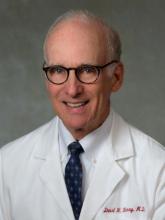Thomas LeBlanc, MD, of Duke Cancer Institute in Durham, N.C., joins host David H. Henry, MD, of Pennsylvania Hospital, Philadelphia, to discuss the evolution of the palliative care field and some of the underrecognized ways that it can improve care for hematology-oncology patients.
Plus, in Clinical Correlation, Ilana Yurkiewicz, MD, of Stanford (Calif.) University, shares the story of a patient who put aside her own desire for hospice because of family pressure to pursue curative treatment.
* * *
- Palliative medicine has evolved tremendously over the past decade; it used to be synonymous with hospice and dying. It is now a sophisticated medical subspecialty with growing and large evidence base.
- Palliative treatments are aimed at maximizing patient's quality of life and can be provided alongside other curative treatments.
- Physicians, physician assistants, and nurse practitioners form an interdisciplinary team along with patients and their families.
- Palliative care specialists can work alongside oncologists to optimize symptom management in patients with multiple or refractory/severe symptoms, including chemotherapy-induced nausea and pain neuropathy.
- Palliative care specialists also can help provide a safe space and an extra layer of support to patients having difficulty coping with illness.
- The American Society of Clinical Oncology (ASCO) has developed a guideline that all patients with advanced cancer should be receiving dedicated palliative care services concurrent with active treatment.
- Workforce shortages in palliative care are limiting access for patients with cancer.
Resource:
Integration of palliative care into standard oncology care: ASCO Practice Guideline update (2017)
Show notes by Debika Biswal Shinohara, MD, PhD, resident in the department of internal medicine, University of Pennsylvania, Philadelphia.
* * *
For more MDedge Podcasts, go to mdedge.com/podcasts
Email the show: podcasts@mdedge.com
Interact with us on Twitter: @MDedgehemonc
David Henry on Twitter: @davidhenrymd
Ilana Yurkiewicz on Twitter: @ilanayurkiewicz

